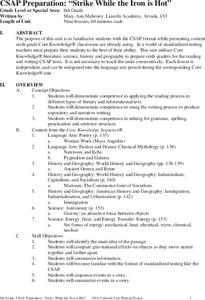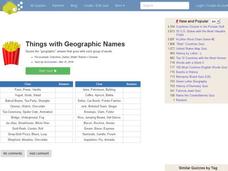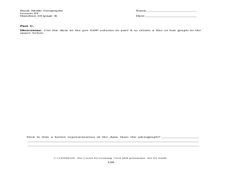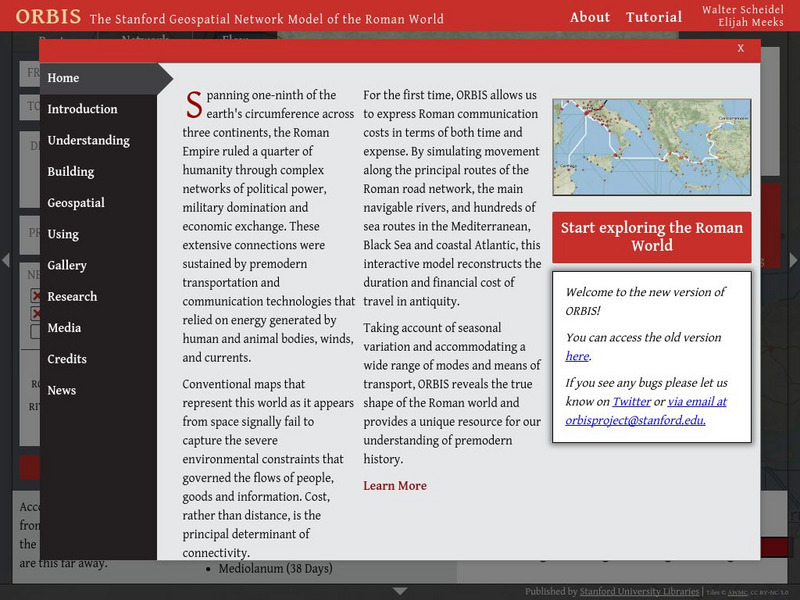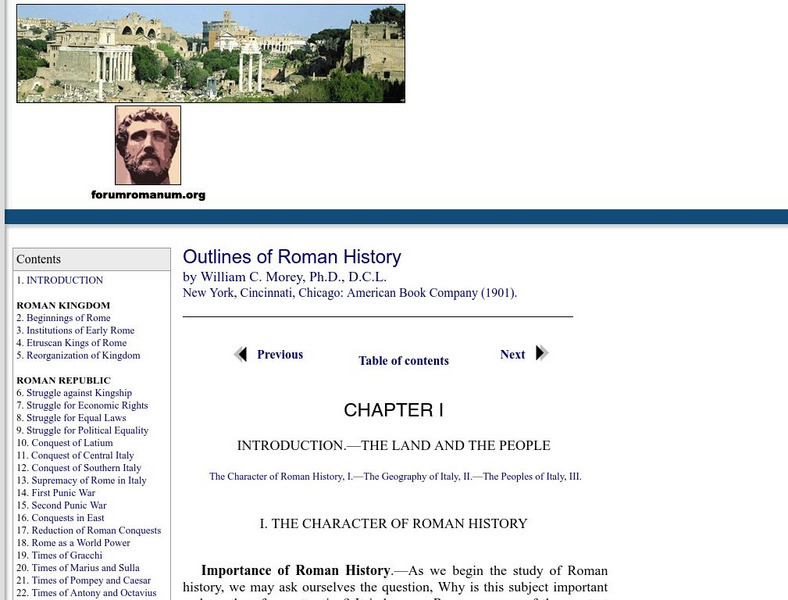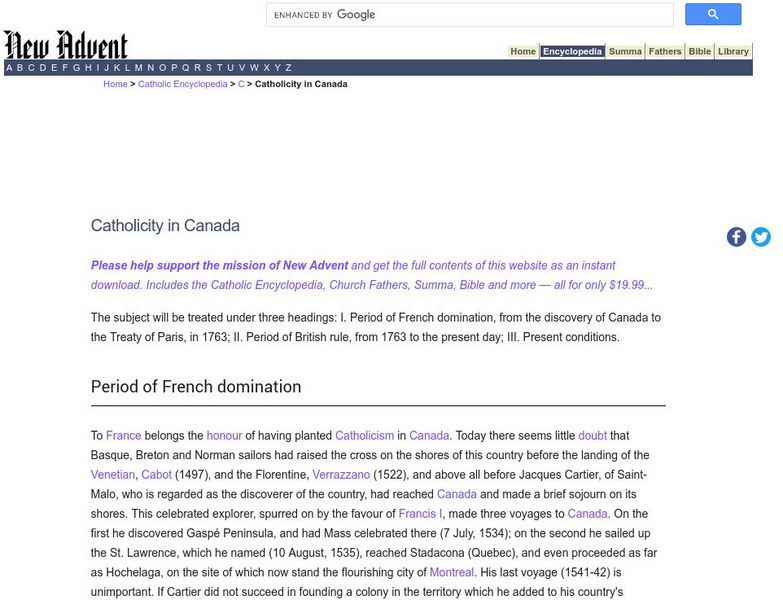Curated OER
CSAP Preparation: "Strike While the Iron is Hot"
Students survey several concepts in literature, science, history, and geography as a preparation for the CSAP standardized testing experience. This nine lesson unit provides exposure to the format and content of the test.
Curated OER
Etruscan Settlement Uncovered
In this geography instructional activity, students read an excerpt about the Etruscans who settled in an Italian city recently discovered. They respond to four questions about the excerpt that identify why the Etruscan people were ahead...
Curated OER
Inca Artifacts and Civilization Lesson Plans
By learning about Inca artifacts and this ancient civilization students can delve into history, geography, and much more.
Curated OER
Things w/ Geographic Names Quiz
In this online interactive geography quiz worksheet, students respond to 31 identification questions about products or things with geographic names. Students have 4 minutes to complete the quiz.
Curated OER
Silk Road Caravan
Students determine how the geographic features of the Silk Road trade route contributed to the economic development and diffusion of culture in both Eastern and Western Civilizations.
Curated OER
John Paul II: Statesman of Faith
Students view a documentary on Pop John Paul II. He is the spiritual leader of almost one billion people worldwide and beloved ambassador of peace to untold millions more. After viewing, students discuss what they saw and create a...
Curated OER
The Impact of Islamic Culture on the Arts of the Renaissance
Eighth graders examine the linguistic and cultural impact of the Arabic language and Islamic culture on the Spanish language. They analyze and label maps, listen to and differentiate between Spanish and Arabic music, and compare and...
Curated OER
Moving With Your Roots
Students dissect common words to study the origins of those words. In this language arts lesson, students study the Greek and Latin roots found in many words within English language. Students use dictionaries to fill out worksheets...
Curated OER
The Life and Death of the Byzantine Empire
Ninth graders understand the state of the world around the year 1000 AD as it pertains to the Byzantine Empire. They analyze and discuss the characteristics of the Byzantine Empire.
Curated OER
Population and Population Density
Students read and interpret graphs. In this population instructional activity, students explore population and population density as they read several data graphs and respond to questions.
Curated OER
Metalling in Around the World
Third graders explore the important leaders in different cultures by researching coinage. Through this process, they also recognize the cultural universality on coinage and currency.
Curated OER
Lorna Doone
Students examine life in the early 17th century by viewing a film called "Lorna Donne". They identify the politcal scene at the time while noting the major characters. They practice using new vocabulary as well.
Curated OER
Multiculturalism Through African Folk Tales And Mayan Myths
Students study the myths of various African cultures and of the Mayan people. They identify unique characteristics of African myths and Mayan myths. They define and recognize the style and tone of the Mayan myths and create their own...
Other
The Roman World 509 b.c. To a.d. 180
This narrative site provides great overview to life in ancient Rome and Roman history. The geography, early settlers, Roman monarchy, Roman conquest of Italy are all mentioned.
Other
Maps of Ancient Rome
This ancient history site features maps of Rome from just the "seven hills" to the entire city plan with the areas labeled in Latin.
Stanford University
Orbis: The Stanford Geospatial Network Model of the Roman World
A geospatial model mapping the roads and trade routes of the Roman world reconstructs the time and cost associated with travel and trade around 200 CE.
Forum Romanum
Outlines of Roman History: Introduction the Land and the People
This is the introductory chapter of Morey's 1901 textbook on Roman History. It sets out the geography of Italy and the Italic tribes who lived there. The text is old, but surprisingly easy to read and packs in a lot of information.
Forum Romanum
Outlines of Roman History: Beginnings of Rome: The Situation of Rome
The seven hills of Rome are shown on two maps, showing the hills and their relation to neighboring lands on the Italian peninsula. There is a brief discussion on the geographic importance of the hills.
Other
Ministry of Culture and Communication: Paris, a Roman City
Explore the history of Paris (or Lutetia, as the ancient Romans called it) by following archaeological remnants and still-extant traces of its earlier inhabitants. Paris, A Roman City, focuses principally on the Roman phase of the city's...
Other
Edublog: Dalton School: Rome Project
Looking for data about Classical Rome, check out the resources provided by The Dalton School.
Smithsonian Institution
National Museum of American History: Parthia: The Forgotten Empire
The Parthian Empire lasted for five hundred years and have been mostly forgotten, despite their prowess in the Middle East. Their kingdom began in 247 BC when Arsaces I was elected as King of Parni. They were the only civilization that...
Franco Cavazzi
Roman empire.net: Roman Empire Map
This site from Roman-Empire.net provides an interactive map of the Roman Empire. The expanse of the empire can be viewed by dates. The site can be searched by Provinces, Territories, Tribes, Towns, Cities, or Barbarian Incursions.
Friesian School
Fresian School: Animated History of Rome and Romania
This animated graphic, which is provided by the Fresian School, allows you to see how Rome grew and shrank between 300 BC and 1453 AD. The map changes in increments of about 50 years.
New Advent
Catholic Encyclopedia: Catholicity in Canada
This entry from the Catholic Encyclopedia traces the history of the Roman Catholic Church in Canada from New France to discussions of state-funded schooling. Please note that the Catholic Encyclopedia is a historic reference document...


